
The aspiring tyrants of today have not forgotten the lesson of
The aspiring tyrants of today have not forgotten the lesson of 1933: that acts of terror - real or fake, provoked or accidental - can provide the occasion to deal a death blow to democracy.






“The aspiring tyrants of today have not forgotten the lesson of 1933: that acts of terror—real or fake, provoked or accidental—can provide the occasion to deal a death blow to democracy.” So warns Timothy D. Snyder, the historian of liberty and conscience, whose words ring like a trumpet across the valleys of complacency. In this single sentence, Snyder gathers the shadows of the past and casts them upon our own age. He reminds us that tyranny is not a ghost long buried—it is an ever-living hunger, waiting for fear to open the door. The lesson of 1933 he speaks of is no mere date in a book—it is a moment of moral collapse, a wound carved into the flesh of history.
For in that year, the flames of the Reichstag Fire rose above Berlin, and with them, the death cry of the German Republic. The parliament burned, and whether by design or deceit, it mattered little—what followed was the same. Adolf Hitler, newly appointed Chancellor, seized upon the terror to crush his opponents, suspend civil rights, and proclaim a “temporary” emergency that became eternal. Fear became law; obedience became virtue. Within days, a free people were bound in chains—not by invasion, but by the corruption of their own trust. Thus, the fire that destroyed a building also consumed a democracy.
Snyder’s warning reaches across time: “The aspiring tyrants of today have not forgotten.” They know that fear is the oldest weapon of despotism, sharper than any sword. When terror—whether real or fabricated—grips the heart of a nation, its people cry not for freedom, but for safety. And it is then, when the soul of a democracy trembles, that the tyrant steps forward, promising protection while stealing power. The ancients knew this truth well: as Tacitus wrote, “The more corrupt the state, the more numerous the laws.” Fear breeds control, and control, once granted, seldom returns to the governed.
Look to the story of Rome, whose Republic too fell not by conquest, but by fear. In the time of Julius Caesar, the Senate surrendered its own strength, granting him emergency powers to “save” the state from chaos. The assassins who struck him down thought to restore liberty, but it was too late—the people had learned to trade freedom for order. From that moment, the Republic died and the Empire rose, gilded and magnificent, but hollow at its core. What Hitler did with the Reichstag, Caesar did with the Senate: both proved that a frightened populace is the surest foundation for tyranny.
And what of our own age? The tools have changed, but the pattern endures. Acts of terror, whether in fire or in rumor, whether on screens or in streets, still awaken the same ancient dread. Modern tyrants, cloaked in populism or nationalism, still speak the language of protection. “We will keep you safe,” they promise, while dismantling the very liberties that give safety meaning. They conjure enemies, real or imagined, to justify surveillance, censorship, and the silencing of dissent. Thus, step by step, law by law, the death blow to democracy is struck—not with a roar, but with applause.
Yet Snyder’s message is not only a warning—it is a call to courage. For if tyrants remember the lesson of 1933, then the defenders of liberty must remember it too. We must not let fear blind us. We must question even in crisis, and demand truth even when lies are more comforting. The light of democracy depends not on the absence of danger, but on the presence of vigilance. Every citizen is a guardian of the flame, and if we neglect our watch, it will be extinguished—not by enemies abroad, but by indifference within.
Therefore, O children of the free world, let this teaching be engraved upon your hearts: beware the politics of fear. When leaders exploit tragedy to demand obedience, resist. When they promise salvation through control, doubt them. Remember that freedom once surrendered rarely returns; that democracy is not a gift, but a duty renewed each generation. Study the past not as distant memory but as warning. For the tyrant’s weapon is terror, but the antidote is courage—the courage to think, to question, to stand firm when others bow.
And so, heed the voice of Timothy Snyder, for it speaks as the ancients would: guard your liberty as you would your soul. Fear will come, as it always does—but let it not make you weak. Stand as those who remember 1933, not as those who repeat it. For the fire that once consumed a parliament must never again consume the world.






AAdministratorAdministrator
Welcome, honored guests. Please leave a comment, we will respond soon